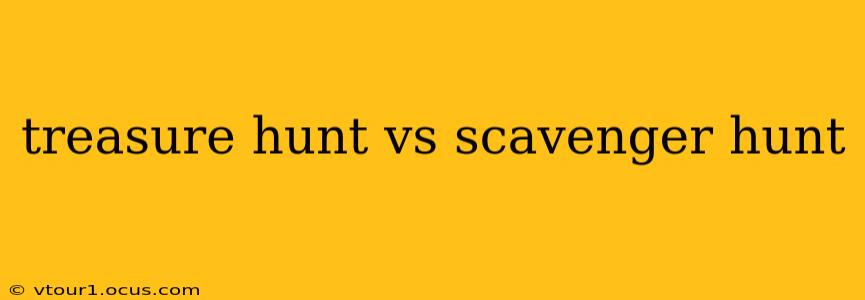Treasure hunts and scavenger hunts are both exciting games of exploration and discovery, but they possess key differences that set them apart. While both involve finding hidden items, the nature of the clues, the ultimate goal, and the overall experience differ significantly. This article will delve into the nuances of each, answering frequently asked questions and clarifying the distinctions between these popular activities.
What is a Treasure Hunt?
A treasure hunt centers around the discovery of a single, significant prize – the "treasure." This treasure can be anything from a physical object (like a chest filled with goodies) to a symbolic reward (like a privilege or a title). The clues provided often lead participants on a more narrative-driven journey, sometimes involving riddles, puzzles, or even historical facts. The focus is on the journey and the unfolding story as much as the final prize. The clues are typically more complex and challenging, often requiring problem-solving skills and lateral thinking.
What is a Scavenger Hunt?
A scavenger hunt, on the other hand, typically involves finding a list of specific items or completing tasks. The "treasure" is less of a singular prize and more of the satisfaction of successfully completing the hunt. Clues often lead to locations or objects that are readily identifiable and don't require intense deciphering. The focus is less on storytelling and more on quick-witted observation and efficiency. The overall challenge lies in the quantity and diversity of items to find, not necessarily their difficulty.
What are the Key Differences Between a Treasure Hunt and a Scavenger Hunt?
Here's a table summarizing the key differences:
| Feature | Treasure Hunt | Scavenger Hunt |
|---|---|---|
| Goal | Finding a single, valuable prize ("treasure") | Finding a list of items or completing tasks |
| Clues | Complex, often narrative-driven, puzzles | Simpler, often straightforward, location-based |
| Challenge | Problem-solving, lateral thinking | Quick-witted observation, efficiency |
| Focus | Journey and storytelling | Item collection and task completion |
| Prize | Significant, often singular | Less significant, often multiple small prizes |
What type of clues are used in a treasure hunt?
Treasure hunt clues often involve riddles, puzzles, ciphers, or even historical facts that require research and interpretation. They might lead participants to specific locations using geographical coordinates, historical markers, or cryptic descriptions. The complexity of the clues is designed to increase the challenge and engagement of the hunt.
What type of clues are used in a scavenger hunt?
Scavenger hunt clues tend to be more straightforward. They might involve simple descriptions of items or locations, photographs, or even coordinates. The goal is to be clear and concise, allowing participants to quickly locate the next item on the list. The emphasis is on efficiency rather than elaborate problem-solving.
Are treasure hunts more difficult than scavenger hunts?
Generally, yes. Treasure hunts usually demand higher levels of problem-solving skills and critical thinking, while scavenger hunts are more about finding specific items or completing straightforward tasks efficiently. However, the difficulty of either can be adjusted based on the target audience and desired level of challenge.
Which is better for kids?
Both treasure hunts and scavenger hunts can be excellent activities for children, with the best choice depending on their age and abilities. For younger children, a simple scavenger hunt with readily identifiable items is likely more suitable. Older children might enjoy the challenge and narrative elements of a well-designed treasure hunt.
Can I combine elements of both?
Absolutely! A well-crafted game can incorporate elements of both treasure hunts and scavenger hunts. You could have a series of scavenger hunt clues that ultimately lead to a final treasure, combining the best aspects of each format. This allows for flexibility and creativity in designing a truly unique and engaging experience.
In conclusion, while both treasure hunts and scavenger hunts offer fun and exciting adventures, understanding their core differences allows you to design and choose the perfect activity for your specific needs and preferences. Remember to tailor the difficulty and complexity to your participants' age and abilities to ensure everyone has an enjoyable and memorable experience.
